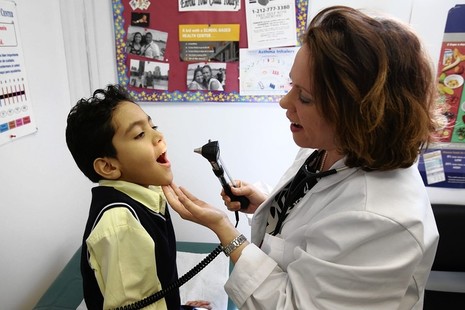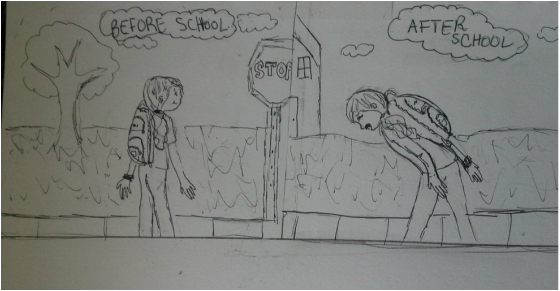 By Samantha Gougher Editor It’s an undeniable fact that much happens during a single school day. When a high school student is taking six classes with different teachers and varying levels of difficulty, it makes sense that the tests, presentations, and blue books can really pile up. However, there are certain things that must be prioritized over the constant flood of work that a Council Rock North student has to handle, the most prominent of which is health. It seems that, in junior year more than any other, students are forgoing the sick days they may need in order to avoid missing school and its associated work. This decision can be detrimental to the individual and the entire school for obvious reasons: sick people get sicker if they don’t take time to heal, stress certainly won’t help someone overcome an illness, and ailments such as colds or the flu may spread to other students, thus worsening the problem. It’s difficult to really identify who the culprit is in this situation, due to its moral complexity. It’s not as though students are coming ill to school out of malice; they’re most likely just feeling pressured by whatever tests they have in classes such as English and Spanish that day. It’s not the teachers’ faults, either; they’re just giving tests according to their own calendars and syllabi. Parents also are difficult to blame because they often simply want their children to succeed, and being present in school is one of the most effective ways of accomplishing that goal. Despite the lack of an antagonist in this issue, the problem is real. School nurse Stacy Gaughan confirms that she sees students who are “conscious” of their condition “very frequently,” listing “tests, presentations, [and] parents” as their reasons for coming to school despite their illnesses. She adds that “95 percent” of the time, she will send those students home. She advises that if a student is “truly sick, [he or she] should stay home” and wait to get better. She also confirms that “[illnesses] tend to spread through the school” rapidly, supporting the idea that perhaps that one vocabulary quiz isn’t worth infecting one’s entire friend group. Beyond the physical ailments that students may experience, another health issue that should be prioritized by North students is mental health, for teenagers are especially prone to anxiety, depression, and eating disorders. No one wants a student to have to experience those illnesses--not teachers, peers, or parents. Please take care of yourself and recognize when things are too much. You’ll be happier and more successful in school if you can determine when you feel okay to go. Thus, if you are sick, mentally or physically, it may not be a helpful idea to come to school. There are many reasons that justify this thinking: the nurses will probably just send you home, there’s a risk of your getting everyone else sick, and health should ultimately be prioritized over schoolwork. Teachers aren’t evil; there are ways for you to make up work and follow up on missed assignments. Nobody wants you to fail, but by dragging yourself to school while sick, you’re just making things more difficult for yourself. Try to communicate with your teachers, your own body, and your parents, and you’ll most likely see a common thread of agreement: everyone just wants you to get better.
1 Comment
 By Margaret Zheng Reporter I began high school desiring to learn. I didn’t want to worry about the future yet, fearing that to study for college was giving up the joy and essence of learning. Must high school eliminate the joy of the present in order for students to see the future? English teacher Ms. McKenney believes the answer to that query depends on the student. Some prefer to plan, to be “here and now”; some, however, pursue college or a similar goal. As a teacher passionate about reading, Ms. McKenney wants her students to reach for fiction in order to stimulate their imaginations and their intellect, since that path specifically is often forgotten. “We’re going to read Romeo and Juliet because there is a magical story behind it,” she says, “[and] we’re going to read Frankenstein because it will make [students] think.” Mr. Crooke, the orchestra director, makes similar comments about teaching music. He hopes his students remain involved in music beyond their high school years since music enriches life. “They may not know it,” he says, “but [my students] are developing a keener appreciation and habit by doing music.” Says Melody Wu, a senior planning for college, “Don’t limit yourself; don’t be so sure of yourself." She finds that being unsure of her future major allows her to “experiment” within her larger interest in STEM fields and eliminates the chore of taking challenging but otherwise “unnecessary” classes like AP World History. School, to Wu, is for learning and experiencing various academic perspectives that help her find her love. However, to senior Neil R. McKenna, who hopes to become an Air Force Pararescue medic, the experiences school provides should directly relate to what is needed in the workplace. He sees no use in learning abstract math such as algebra and geometry, but he remarks that “we’re not born with the inherent ability to balance a checkbook.” After speaking with these insightful students and teachers, I have concluded that even though the future will always demand to be sketched in view, it is my choice when and how to paint the present. I dab my brush in sunrise, immersing my thoughts in dreamy skies, while keeping foot on stable ground, coaxing my little light to shine, for a brighter future, and a beautiful now. Perhaps high school and its multitude of experiences can do the same for us all.  By Maithri Nimmagadda Reporter I am not going to claim to be all-knowing after surviving approximately two months of high school. Now that my evident lack of superior knowledge and experience has been established, I would like to retell my experience, along with my fellow classmates', of being a freshman in Council Rock High School North. There are quite a few things that tripped up, literally and figuratively, most freshman when transitioning to the high school. First and foremost, the school and its schedule were a bit of a problem. Navigating through a school at least twice the size of the middle school was unnerving; backpack trains, hand holding, and stalking fellow classmates were all activities that may have taken place that first day--ok, fine . . . first week. Many a freshman was claimed by the race from one side of the building to the other. The schedule of scattered classes on different floors made it even more difficult to steer through the high school. However, a teacher or K.O.M mentor (otherwise known as orange people) was always ready to help. Additionally, the change in responsibility from middle school to high school also was an issue. The classes themselves are much more difficult, and teachers tend to put more responsibility on their students, which generally means more homework. However, homework not only counts as a grade, but also serves as a way to refresh one's mind before tests. Just remember that responsibility is the key to independence and “freedom.” Of course, “lack of sleep” is what beautifully sums up the one awful result of high school. One of the possible causes of this nerve-wracking problem is humanity’s common flaw: procrastination. One way to fight procrastination is to make a schedule and a surefire way to follow it. Lack of sleep can be beaten, so motivate yourself to get rid of those dark circles. Through my “fresh eyes” and those of my classmates, I have realized that high school is tough. Hormones, a large school, and responsibility do add to the mass of stress that can build up. However, I think high school has already started to prepare me for what will come after. It has led me to find my strengths, weaknesses, and self-knowledge on how to “survive.” |
Archives
February 2022
Categories |
 RSS Feed
RSS Feed
